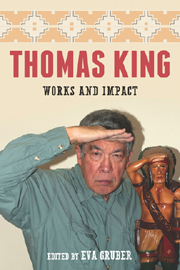Book contents
- Frontmatter
- Contents
- Preface
- Introduction
- Part 1 Works
- Part 2 Impact
- Part 3 Approaches
- Part 4 Encounters
- 16 Storytelling in Different Genres: A Conversation with Thomas King
- 17 Thomas King and the Art of Unhiding the Hidden
- 18 The Truth about Thomas
- 19 Misdirection Is Still a Direction: Thomas King as a Teacher
- 20 Tom King and the Dead Dog Café
- 21 Dead Dog Café: Being an Indian on Air
- Part 5 Thomas King—A Bibliography
- Notes on the Contributors
- Index
17 - Thomas King and the Art of Unhiding the Hidden
from Part 4 - Encounters
Published online by Cambridge University Press: 05 February 2013
- Frontmatter
- Contents
- Preface
- Introduction
- Part 1 Works
- Part 2 Impact
- Part 3 Approaches
- Part 4 Encounters
- 16 Storytelling in Different Genres: A Conversation with Thomas King
- 17 Thomas King and the Art of Unhiding the Hidden
- 18 The Truth about Thomas
- 19 Misdirection Is Still a Direction: Thomas King as a Teacher
- 20 Tom King and the Dead Dog Café
- 21 Dead Dog Café: Being an Indian on Air
- Part 5 Thomas King—A Bibliography
- Notes on the Contributors
- Index
Summary
I like to think that my education in deconstruction began in graduate school with Thomas King's iconoclastic essay “Godzilla vs. Post-Colonial.” King's essay opens with a personal anecdote that seems, on first glance, easy enough to follow. He explains that by his first year of high school, he had already attained his full height. A coach, priding himself on his ability to spot talent, told King that he'd have a knack for basketball and that he should try out for the team. But, as it turns out, King wasn't even mediocre; worse, his dismal career was cut short by an injury at the start of the second season. Just when we are set to mourn the loss of his chance at becoming an all-star player, King shifts the focus of the essay. As he explains, his experience taught him “little about basketball, but … a great deal about assumptions” (King 1990, 10), and he proceeds with razor-sharp logic to deconstruct prevailing assumptions about the value of the term “post-colonialism,” and to clarify why “it will not do to describe Native literature” (12).
Like Godzilla perched atop the Empire State Building, King's essay threatened the prevailing pedagogical discourses that advocated viewing Canadian literature from a postcolonial framework, and his rebuttal of this paradigm remains valid today. In retrospect, I realize that of equal importance is King's insistence that critical terms such as “postcolonialism” are not “‘bags’ into which we can collect and store the whole of Native literature.”
- Type
- Chapter
- Information
- Thomas KingWorks and Impact, pp. 281 - 288Publisher: Boydell & BrewerPrint publication year: 2012

